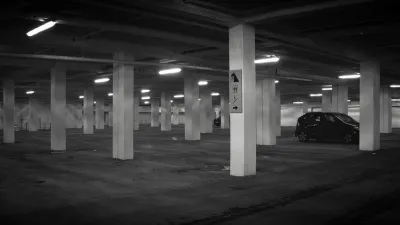An architect makes the case for future-proofing new parking garages so they can easily shift to other uses in a future with fewer cars.

Megan Ridgeway's hunch is that "our cultural shift to ride sharing, autonomous vehicles, and alternative transportation will result in a permanent paradigm shift in urban planning." Whether that means fewer cars on the road is hard to say, but if driving does decline, what will become of America's half-billion parking spaces?
Parking garages, Ridgeway argues, should be "future-proofed" upon construction. If and when a carless future arrives, they'll be easy to convert to alternative uses, including housing. "Specifically, the most important design strategies for such structures are flat plates and adequate space between floors. Adaptive reuse requires a level base rather than the steep slopes that many garages have, so designing flat floors on every level is critical."
In this case, future-proofing shouldn't be too onerous an expense: "the up-front cost is virtually the same as traditional parking garages because they aren't as expensive to build as an actual office or apartment building." The real question is whether individual municipalities will help or hinder their implementation.
Ridgeway cites Denver as one place where developers are pioneering future-proof parking, specifically at the city's World Trade Center.
FULL STORY: Design parking garages so they can easily become housing

National Parks Layoffs Will Cause Communities to Lose Billions
Thousands of essential park workers were laid off this week, just before the busy spring break season.

Retro-silient?: America’s First “Eco-burb,” The Woodlands Turns 50
A master-planned community north of Houston offers lessons on green infrastructure and resilient design, but falls short of its founder’s lofty affordability and walkability goals.

Delivering for America Plan Will Downgrade Mail Service in at Least 49.5 Percent of Zip Codes
Republican and Democrat lawmakers criticize the plan for its disproportionate negative impact on rural communities.

Test News Post 1
This is a summary

Test News Headline 46
Test for the image on the front page.

Balancing Bombs and Butterflies: How the National Guard Protects a Rare Species
The National Guard at Fort Indiantown Gap uses GIS technology and land management strategies to balance military training with conservation efforts, ensuring the survival of the rare eastern regal fritillary butterfly.
Urban Design for Planners 1: Software Tools
This six-course series explores essential urban design concepts using open source software and equips planners with the tools they need to participate fully in the urban design process.
Planning for Universal Design
Learn the tools for implementing Universal Design in planning regulations.
EMC Planning Group, Inc.
Planetizen
Planetizen
Mpact (formerly Rail~Volution)
Great Falls Development Authority, Inc.
HUDs Office of Policy Development and Research
NYU Wagner Graduate School of Public Service





























